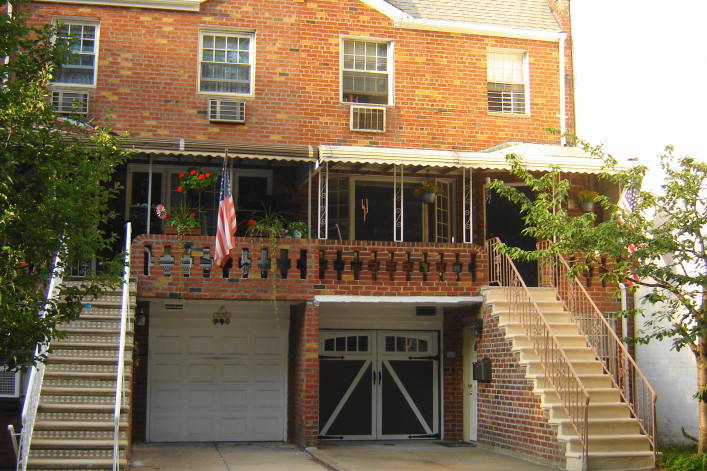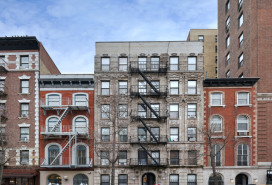So you wanna be a landlord? 10 things to ask before buying a home with a rental unit

Newlyweds Shirley Jian and Peter Chan just bought their first house, a four-bedroom, two-family in Fort Hamilton, Brooklyn for $968,000. They figure the duplex rental unit will cut their monthly costs in half. But not yet. They're currently upgrading the ground-floor space.
“Buyers like us need to make room in their budget for renovations and for the time it will take to do any work needed in the rental unit before it can be rented out," Chan says. They bought the house in December 2013, and expect to rent out the second unit in April.
The experience is likely familiar to anyone who recently bought a home with one or two rental units: Done right, it can help pay the mortgage and upkeep on your property. Done wrong, it can be a nightmare that sucks your time and money.
"About 30 percent of the deals on my desk are for properties with rental units in them,” says attorney Wendy Fitzsimons, a principal at Madison Law Group. "My overreaching concern is the lack of leverage that these buyers have. Sellers expect buyers to act with warp speed, not giving them enough time to ask the right questions and get the right answers before they buy.”
Before you sign on the dotted line, be sure to ask these 10 questions:
1. How does a rental unit affect the sale price?
The short answer is, it depends where you're buying the home and what kind of price range you're looking at.
In Manhattan, single-family homes actually tend to be more expensive than homes with rental units. The median sales price for a Manhattan two-family was just shy of $3 million in 2013, while a single-family was $4.65 million, according to appraiser Jonathan Miller of Miller Samuel, Inc.
"Two-family homes are purchased for their potential to convert to single-family, but they are worth less than a single-family house in terms of value because the buyer has to convert," Miller explains. "The current value is not based on the income that a two- to four-family home could generate through rentals, but rather the potential value they could have less cost and hassle to convert to single-family."
Also, the addition of a rental unit will have a bigger impact on prices for homes at the lower end of the market, adds BrickUnderground's own Rent Coach, real estate broker Mike Akerly of the Aguayo Team at Halstead Property Development Marketing.
“At the higher end of the market, the addition of rental income does not add value as the demographic values the luxury of more square footage and privacy over the additional income," he says. "In lower price points, where the demographic will often be relying upon the projected rental income as part of their mortgage application, it adds value, which can in turn affect pricing.”
2. Does the Certificate of Occupancy match what the seller is telling you?
A certificate of occupancy states what the legal use of a building is and how many rental apartments it has. This information is essential because you need the C of O to get financing, and if there’s no C of O stating that you can have a rental unit, you cannot legally collect rent and any tenant could refuse to pay rent.
In the case of Chan and Jian, the challenge was to find a house with a registered, legal rental unit, says their broker, Rosalie Alario of Citi Habitats.
“There were plenty of sellers who had an apartment in their home that they ‘rented out,’ but nothing was ever done to make the rental unit legal--nothing on a C of O," she says. "We kept looking until we found one that was legitimate.”
A house with a rental unit can help you qualify for a mortgage by giving you extra income to use and by helping with the debt ratios, explains Robbie Gendels of National Cooperative Bank.
However, it won't reduce the interest rate or require a larger down payment, she adds.
For a one-family, a standard down payment is at least 10% to 20%, but for a two- to four-family, expect to put down as much as 25% to 30%, according to Kimberly Jay, an agent with Elliman.
Also, rental income can be included in your mortgage application, which qualifies you for a higher loan amount, "but it will be discounted 25%," says Ezra Tawil, a senior loan officer at Sterling National Bank, to account for possible vacancy. "Suppose a tenant leaves and it takes three months to find a new tenant. If the borrower needs that rental income to pay the mortgage they will fall behind.” "
What this means, in terms if numbers, Tawil says, is that "if the rent on the apartment in your building is $3,000 per month, you will be able to add $2,250 in income to your financial report."
4. Does the current tenant have a lease--and can I get a copy?
“You have to know whether there is actually a lease in place,” says Victoria Vinokur, an agent with Halstead Property. “At times, in brownstones, there is a tenant who has been ‘renting’ from the owner for years but there is no current lease in place. This situation creates complicated legal issues when it comes to transferring the property."
Assuming there is a lease, you need to get a copy of it and have your attorney and broker review it.
"You need to know how much time before the lease will expire, if the apartment is market rate, are there termination clauses in the lease and is the lease for a rent controlled or stabilized apartment,” cautions Ari Harkov, an agent with Halstead.
5. Is the seller exaggerating the rent?
“Sometimes sellers will report inflated rents on a rental unit to make the deal more attractive," Harkov notes.
Be sure to double check that the figure you have is accurate and, he advises, check the going rent for comparable units on StreetEasy or other rental websites.
6. What's involved in converting to a single-family later on?
If the apartment is rent regulated--either rent-controlled or rent-stabilized--it will be more difficult to take over the whole house for yourself when the tenant's lease expires, experts say.
“If there are rent-controlled or stabilized tenants in place, the tenants will have the right to remain in possession either through statutory tenancy or guaranteed renewal leases until certain legal benchmarks are hit," Akerly says.
Additionally, he adds, rents are set by city and state agencies, "so you will have little ability to add value to the property or your rental income" by renovating the unit.
But note, there are ways to turn a regulated unit into a market-rate rental, such as when the state-mandated rent clears a certain level (currently $2,500) for a rent-stabilized unit, or if a rent-controlled tenant moves out.
"Short of that, the law does allow the recapture of stabilized units by the owner when the intent is to use it as part of their primary residence for themselves or an immediate family member," Akerly says.
But make sure to consult an experienced attorney if you plan on this so that the tenant can't contest your actions.
For rent-controlled tenants, the owner needs to apply to the Division of Housing and Community Renewal for an order granting a certificate of eviction. According to a DHCR fact sheet, “an owner must establish an immediate and compelling need for the apartment.”
For market-rate tenants, you can terminate the lease when it expires. But there are potential problems involved with this scenario as well.
Elliman's Jay cautions that “there is a risk that the tenant may become a holdover tenant"--one who is being evicted for reasons other than non-payment but refuses to leave--"and that legal action may be required.”
Agent Martin Krasnoff of Rand Realty NY adds, “If you have a tenant who stops paying rent, it takes up to a year to evict. Keep that in mind if you are depending upon their rental to keep you afloat.”
7. Can I meet the current tenants?
Think about it: You’ll be living in the same small building with these people. Wouldn’t you want to know as much about them as possible?
In fact, most brokers and owners “would not be happy about that at all,” says Harkov. “But sometimes it can happen informally if the buyers stop by the building for a look and get to chatting with the tenants on the way in or out. I’m not recommending that a buyer stalk a tenant, of course."
8. Am I up to the job of being a landlord?
When you ask yourself this question, be realistic about the answer.
“Are you really ready to be a landlord? This means that you can be awakened at 4 a.m. by one of your tenants complaining about banging pipes," says Krasnoff. "And you have to hound your tenants to pay their rent on time.”
Some of Fitzsimons' international clients, who live in other countries and may be buying for their children, hire management companies to do the day to day work that a building requires. That may be another option.
9. Who gets to use what?
Think about how you'll divide up access to shared spaces, such as a backyard or basement. (This is especially true for brownstones, since the rental unit is often on the ground floor.)
You may want to allow your tenant to use part of the basement for storage, but you'll want to maintain access to check on the boiler, for example.
“Often the property has a front or rear yard,” says attorney Edan Pinkas of Friedberg Pinkas. “Potential buyers should have a survey done (or ask to see such a survey that has been done previously) to make sure that the property doesn’t interfere with any neighbor’s lot. Is there a fence that might be on someone else’s property, a staircase that extends beyond where it should be?”
10. What kind of insurance do I need?
"Your insurance must cover a loss of rents if a covered peril, like fire, forces the tenants out,” says Jeffrey Schneider of Gotham Brokerage Company.
If your tenant doesn't have his or her own coverage--which is recommended--you should advise them that your insurance will not cover them or the contents of their apartment, he adds.
“There are situations where the owner’s negligence may cause damage to the tenant’s property and that would generally be covered by the owner’s insurance, but many common events, like an old pipe breaking without prior signs of damage, don’t involve negligence.”
Related posts:
10 things to consider before buying a brownstone
BrickUnderground's 7- step guide for first-time landlords
Is it a good idea to buy a co-op in a brownstone?
7 questions to ask about the building before you buy an apartment there (sponsored)
How to buy an apartment that's not for sale using PropertyShark.com (sponsored)






















